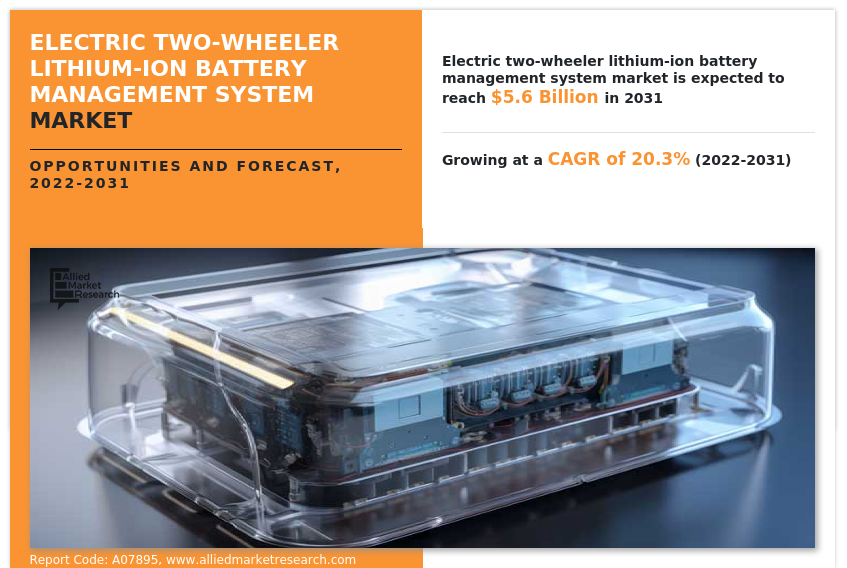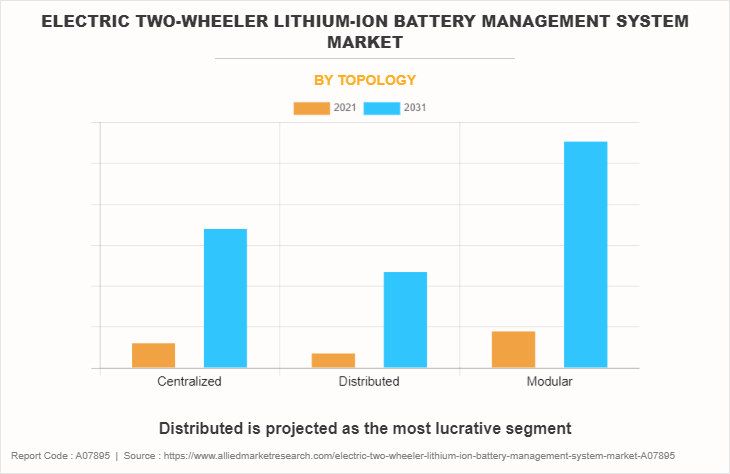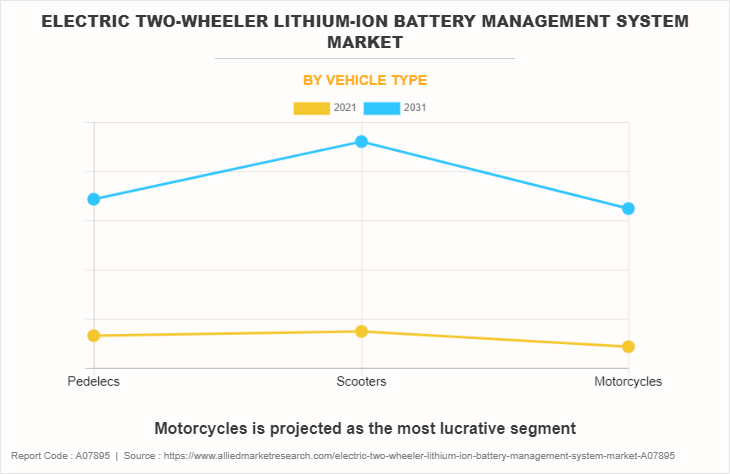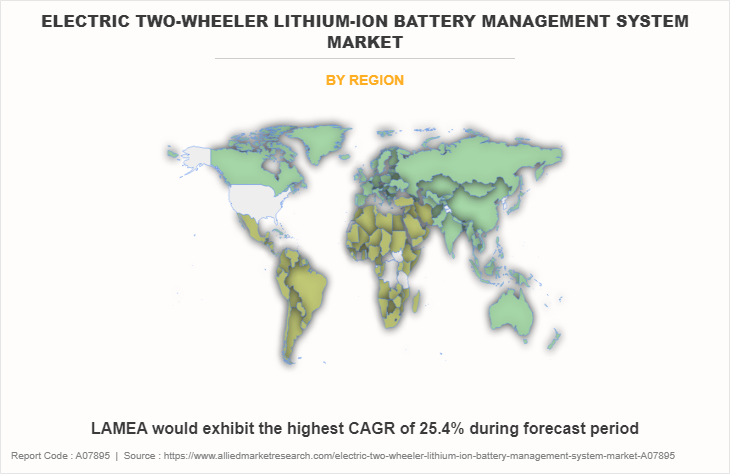The global electric two-wheeler lithium-ion battery management system market size was valued at $0.90 billion in 2021, and is projected to reach $5.6 billion by 2031, growing at a CAGR of 20.3% from 2022 to 2031.
Report Key Highlighters:
- The electric two-wheeler lithium-ion battery management system market study covers 12 countries. The research includes regional and segment analysis of each country in terms of value ($million) for the projected period 2023-2032.
- The study integrated high-quality data, professional opinions and analysis, and critical independent perspectives. The research approach is intended to provide a balanced view of global markets and to assist stakeholders in making educated decisions in order to achieve their most ambitious growth objectives.
- Over 3,700 product literature, annual reports, industry statements, and other comparable materials from major industry participants were reviewed to gain a better understanding of the market.
- The electric two-wheeler lithium-ion battery management system market share is moderately consolidated among several players including Elithion Inc, Jiangsu Xinri e-vehicle Co., Ltd., Leclanche SA, Lithium Balance, Mahindra & Mahindra Ltd., Navitas System LLC, Nuvation Energy, NXP Semiconductors, Renesas Electronics Corporation, Shenzhen Litongwei Electronic Technology Co., Ltd, Texas Instruments Incorporated, and Yamaha Motor Co., Ltd..

The electric two-wheeler lithium-ion battery management system market is segmented into Topology and Vehicle Type.
A battery management system is an electronic system that controls and monitors charging and discharging of battery and provides notifications about the status and condition of battery packs. In addition, providing critical safeguard to protect batteries from damage is one of the primary functions of battery management system. In addition, lithium-ion battery can also be damaged if discharged below certain threshold, which is around 5% of the total capacity. If the batteries are allowed to discharge below this level, the battery might get damaged permanently.
Factors, such as increase in adoption of electric vehicles (EVs) and hybrid electric vehicles (HEVs), and rise in industry preference for use of lithium-ion batteries drive the growth of the electric two-wheeler lithium-ion battery management system market. In addition, growth in adoption of rechargeable batteries propels the market growth. However, increase in overall price of the products with addition of battery management system hinders the growth of the market. Further, increase in adoption of cloud-connected battery management systems, growth in demand for renewable energy, and growth in demand for e-bikes and e-scooters provide remarkable growth opportunities for players operating in the market.

The electric two-wheeler lithium-ion battery management system market is segmented on the basis of vehicle type, topology, and region. By vehicle type, it is segmented into pedelecs, scooters, and motorcycles. By topology, it is classified into centralized, distributed, and modular. By region, the report is analyzed across North America, Europe, Asia-Pacific, and LAMEA.
Some leading companies profiled in the electric two-wheeler lithium-ion battery management system market report comprises Elithion Inc, Jiangsu Xinri e-vehicle Co., Ltd., Leclanche SA, Lithium Balance, Mahindra & Mahindra Ltd., Navitas System LLC, Nuvation Energy, NXP Semiconductors, Renesas Electronics Corporation, Shenzhen Litongwei Electronic Technology Co., Ltd, Texas Instruments Incorporated, and Yamaha Motor Co., Ltd.
Key Developments in Electric Two-Wheeler Lithium-Ion BMS Industry
In June 2022, Leclanché SA (SIX: LECN), one of the world’s leading energy storage solutions companies, completed development of a third-generation marine battery system designed to support the needs of ship builders in producing 100% electric and hybrid marine vessels.
In May 2022, NXP Semiconductors N.V., a leading automotive semiconductor company, announced a strategic partnership with Foxconn Industrial Internet Ltd., a subsidy company of Foxconn group, to transform car into the ultimate edge device. NXP will provide FII with its comprehensive portfolio of automotive technologies. The initial phase of the joint project will focus on the development of a full digital cockpit solution, based on the NXP i.MX 8 QuadMax. The platform will include digital clusters, and a head-up display (HUD) system, which will enable leading global automotive OEMs and Tier Ones to deliver vivid in-vehicle experiences for their customers. The digital cockpit solution is expected to start mass production in 2023. The companies aim to expand the relationship into UWB-based secure car access, and safe automated driving, augmented by NXP’s leading radar solutions.
In February 2020, Nuvation Energy announced that its configurable high-voltage battery management system (BMS) obtained UL recognition for use in UL 1973 Certifiable Battery Stacks and UL 9540 Certifiable Stationary Energy Storage Systems.
In June 2019, Nuvation Energy signed an agreement with Iron Edison, an energy storage solutions company, to supply low-voltage battery management systems for use lithium iron phosphate battery system for residential solar energy storage applications.
Increase in adoption of electric vehicles (EVs) and hybrid electric vehicles (HEVs)
Governments across the globe have implemented stringent regulations and policies, such as Kyoto protocol, to reduce Greenhouse Gas (GHG) emissions. In addition, rise in awareness regarding harmful effects of petrol and diesel-fueled vehicles on the environment has led to innovations in the automotive industry in the form of electric and hybrid vehicles. Moreover, growth in consumer demand to maximize vehicle efficiency and minimize fuel costs have led to consistent technological advancements in electric and hybrid electric vehicles. The need to optimize utilization of battery storage capacity in electric vehicles and to prevent dangers caused by overheating of battery in electric and hybrid electric vehicles, manufacturers have started to integrate battery management systems in vehicles.
Batteries in electric vehicles can be used only in specified conditions. Therefore, battery management system (BMS) is necessary to monitor the battery state and ensure safety of operations. Battery management system monitors vital operating parameters of batteries such as cell/unit voltage and current; resistance; cell/unit/ambient temperature; electrolyte levels; and more to ensure proper running and health of batteries.
In addition, increase in costs of fuel, coupled with stringent governmental regulations pertaining to carbon dioxide emissions are pushing the adoption of electric vehicles, hybrid electric vehicles, and plug-in hybrid vehicles in developed regions such as North America, Europe, and Japan. For instance, the U.S. American Recovery and Reinvestment Act grants funds to private and government entities to develop hybrid electric vehicles. Moreover, the public transportation sector is also undergoing technological transformations. Rise in air pollution caused by internal combustion engine cars and non-renewable nature of oil-based fuels has incited public bodies to encourage use of hybrid and electric vehicles. Thus, increase in adoption of electric vehicles and hybrid electric vehicles is anticipated to boost growth of the battery management system market in the future.

Rise in industry preference for use of lithium-ion batteries
With the onset of electric-powered drivetrains designed to shift vehicles away from conventional fuels and carbon gas emissions, the future of e-mobility is inclining toward substantial demand for lithium-ion batteries. Battery management systems have become an integral part of lithium-ion batteries. Among various other types of batteries that include battery management systems, lithium-ion batteries hold an important stake in the market, and their sales are estimated to grow rapidly as compared to other batteries, such as lead-acid and nickel-based batteries. They are accepted as battery of interest by electric vehicle manufacturers, owing to their high charge density and low weight.
For instance, Renesas Electronics, a premier supplier of advanced semiconductor solutions, announced its fourth-generation lithium-ion (Li-ion) battery management integrated circuit, which offers maximized battery cell life and longer driving range for hybrid and electric vehicles. Moreover, lithium-ion batteries fail if they are operated outside their safe temperature window, overcharged, or completely discharged. Thus, to ensure safety and prolonged life, they need special care and use of reliable battery management system, especially in high-voltage battery packs used in commercial applications, such as electric vehicles. Automotive and other end-use industries are adopting the lithium-ion battery and thus, is expected to positively impact the battery management system market growth in the future.
Growth in adoption of rechargeable batteries
Governments of both, developed and developing countries have implemented stringent regulations and policies to reduce carbon dioxide emissions. To maintain compliance with these regulations, end-use industries are switching from traditional fossil fuels to batteries and renewable energy sources. Industries, such as automotive use rechargeable batteries extensively. Moreover, battery management system monitors batteries against functions, such as voltage and current, temperature, battery performance, and maintenance scheduling to check whether the battery is overcharged or undercharged. In addition, battery management system also monitors conditions of individual cells in a battery pack.
Increase in overall price of product with addition of battery management system
In the automotive sector, installation of battery management system in vehicles face burden of additional manufacturing costs. In addition, it requires proper cooling system for smooth functioning of battery management system components. Moreover, as all batteries should be connected to the battery management system (BMS) directly, a battery management system needs a lot of ports to connect with all battery packages.
Therefore, use of battery management system can lead to a notable rise in the final cost of a product or application, which may result in reduced demand from cost-sensitive consumers, owing to its high cost, discouraging product manufacturers from using battery management systems despite their proven benefits. Thus, end users who are cost sensitive avoid paying additional amount, which discourages product makers in taking risks to fulfill the demands for manufacturers, in terms of technological innovations and capital investments and, in turn, hinder the growth of the electric two-wheeler lithium-ion battery management system market.

Key Benefits For Stakeholders
- This report provides a quantitative analysis of the market segments, current trends, estimations, and dynamics of the electric two-wheeler lithium-ion battery management system market analysis from 2021 to 2031 to identify the prevailing electric two-wheeler lithium-ion battery management system market opportunities.
- The market research is offered along with information related to key drivers, restraints, and opportunities.
- Porter's five forces analysis highlights the potency of buyers and suppliers to enable stakeholders make profit-oriented business decisions and strengthen their supplier-buyer network.
- In-depth analysis of the electric two-wheeler lithium-ion battery management system market segmentation assists to determine the prevailing market opportunities.
- Major countries in each region are mapped according to their revenue contribution to the global market.
- Market player positioning facilitates benchmarking and provides a clear understanding of the present position of the market players.
- The report includes the analysis of the regional as well as global electric two-wheeler lithium-ion battery management system market trends, key players, market segments, application areas, and market growth strategies.
Electric Two-Wheeler Lithium-Ion Battery Management System Market Report Highlights
| Aspects | Details |
| Market Size By 2031 | USD 5.6 billion |
| Growth Rate | CAGR of 20.3% |
| Forecast period | 2021 - 2031 |
| Report Pages | 229 |
| By Topology |
|
| By Vehicle Type |
|
| By Region |
|
| Key Market Players | Elithion Inc, Jiangsu Xinri E-Vehicle Co., Ltd., Yamaha Motor Co., Ltd., Navitas System LLC, Mahindra & Mahindra Ltd., Renesas Electronics Corporation, Nuvation Energy, NXP Semiconductors N.V., Texas Instruments Incorporated, Leclanché SA, Shenzhen Litongwei Electronics Technology Co., Ltd. |
The global electric two-wheeler lithium-ion battery management system market was valued at $0.9 billion in 2021 and is projected to reach $5.6 billion in 2031, registering a CAGR of 20.3%.
The upcoming trends include greater adoption of battery electric vehicles and rise in demand for rechargeable batteries.
Scooters is the leading application of Electric Two-Wheeler Lithium-Ion Battery Management System Market
Asia-Pacific is the largest regional market for Electric Two-Wheeler Lithium-Ion Battery Management System
The leading companies include Elithion Inc, Jiangsu Xinri e-vehicle Co., Ltd., Leclanche SA, Lithium Balance, Mahindra & Mahindra Ltd., Navitas System LLC, Nuvation Energy, NXP Semiconductors, Renesas Electronics Corporation, Shenzhen Litongwei Electronic Technology Co., Ltd, Texas Instruments Incorporated, and Yamaha Motor Co., Ltd.
Loading Table Of Content...
Loading Research Methodology...



